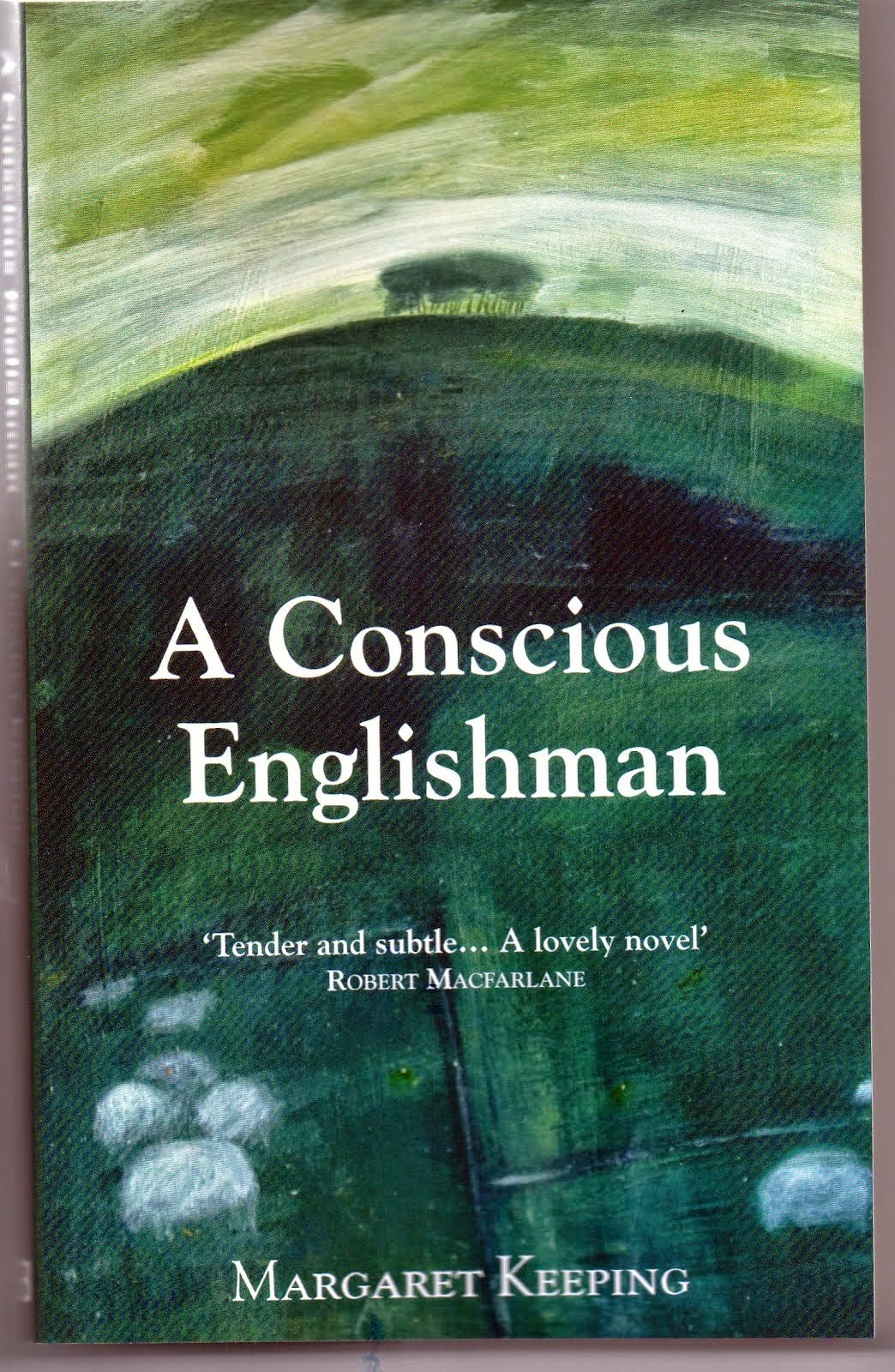In Pursuit of Spring, 2.
Read Matthew Oates, Guardian EnvironmentBlog for an excellent article on 'In Pursuit of Spring.'Chapter III Guildford to Dunbridge, and a riff on clay pipes.
On the Hog's Back he sees gypsies:
'I liked the look of the gypsies camping... If they were not there in fact, they would have to be invented. They are at home there. See them at nightfall, with their caravans drawn up facing the wind, and the men by the half-door at the back smoking, while the hobbled horses are grazing and the children playing near.'
 |
| (I owned a 'vardo' like this for some years but moved to a terraced house so it went to a good home.) |
'A small inn labelled "Cobbett's Birthplace" in letters as big as are usually given to the name of a brewer.'.
No longer:
'The Jolly Farmer burnt down completely in the 1980's - with the post box outside all that remained. We celebrate its resilience by hanging it from one of our rebuilt walls! '. Hhhhmn.
He travelled on westward to Willey Mill on the Wey, the Surrey/Hampshire border.
He travelled on westward to Willey Mill on the Wey, the Surrey/Hampshire border.
 cc Wordpress cc Wordpress |
| Continuing on the Pilgrims' Way near Guildford |
Just into Hampshire hops were grown then:'Many were the buildings related to hops, whose mellow brick work seemed to have been stained by a hundred harvests.'
In a remarkable passage Thomas describes a hunt, emphasising the scarlet riders and ending:
'Backwards and forwards galloped the riders before the right crossing of the railway was taken. The fox died in obscurity two miles away.' Restrained dislike, I read into that 'Backwards and forwards...'
After this the chapter diverts from topology into disquisitions on:
local surnames,
to a tale of two sisters , Martha and Mary, with the characteristics implied by those names,
and then into clay pipes. Edward Thomas always carried his 'clay' a simple workman's pipe, and he riffs at great length on their different shapes, thickness, thinness and suitability.
After this the chapter diverts from topology into disquisitions on:
local surnames,
to a tale of two sisters , Martha and Mary, with the characteristics implied by those names,
and then into clay pipes. Edward Thomas always carried his 'clay' a simple workman's pipe, and he riffs at great length on their different shapes, thickness, thinness and suitability.
He describes the perfect pipe:
'This perfect clay pipe came from a shop at Oxford. Everywhere else I have looked in vain for them. I have never seen any one else smoking them who had not got them from me.
Tastes differ, but in this matter I cannot believe that anyone capable of distinguishing one clay from another would deny this one's excellence.
The Other Man cared nothing for the matter. He awoke from the stupor to which he had been reduced by listening, and asked,-
"Did you see that weather-vane at Albury in the shape of a pheasant? or the fox-shape one by the ford at Butts green? ......'
The Oxford tobacconist on the High Street still exists:

Poem - Digging, the first poem written after Edward Thomas enlisted. He sweeps through aeons of time.
Digging
Publishing matters:
'This perfect clay pipe came from a shop at Oxford. Everywhere else I have looked in vain for them. I have never seen any one else smoking them who had not got them from me.
Tastes differ, but in this matter I cannot believe that anyone capable of distinguishing one clay from another would deny this one's excellence.
The Other Man cared nothing for the matter. He awoke from the stupor to which he had been reduced by listening, and asked,-
"Did you see that weather-vane at Albury in the shape of a pheasant? or the fox-shape one by the ford at Butts green? ......'
The Oxford tobacconist on the High Street still exists:
What matter makes my spade for tears
or mirth,
Letting down two clay pipes into the earth?
The one I smoked, the other a soldier
Of Blenheim, Ramillies, and Malplaquet
Perhaps. The dead man's immortality
Lies represented lightly with my own,
A yard or two nearer the living air
Than bones of ancients who, amazed to see
Almighty God erect the mastodon,
Once laughed, or wept, in this same light of day.
-----------------------------------------------------------------------------------------------------------Letting down two clay pipes into the earth?
The one I smoked, the other a soldier
Of Blenheim, Ramillies, and Malplaquet
Perhaps. The dead man's immortality
Lies represented lightly with my own,
A yard or two nearer the living air
Than bones of ancients who, amazed to see
Almighty God erect the mastodon,
Once laughed, or wept, in this same light of day.
Publishing matters:
30
March 2013 1:07PM A marvellous review on the Guardian web-site today, Saturday
Timely, Shapely.
2014 sees the
100th anniversary of the First World War; attention will be paid to the writers
who remind us. Already the London stage has hosted a play about Edward Thomas,
and this Easter the BBC begins readings from his book 'The Pursuit of Spring'.
Margaret Keeping's 'A Conscious Englishman' is timely.
Her research is
impeccable and she is scrupulous in indicating when she is quoting directly
from letters, diaries, poems; where she must imagine, she convinces. Biography
can be shapeless, but here the problem is solved by structuring the book around
Thomas's search for an answer to the tormenting question - how should he
respond to war? This sharp focus excises undigested lumps of research, much to
this reader's pleasure. (It could be argued that the relationship with Edna
Clarke-Hall is a diversion, but you have only to track her photograph on the
internet to understand her allure.)
Helen Thomas has
written devotedly of her marriage, and although to a later generation it may
lack attraction, Margaret Keeping is wise and generous enough to understand
that where both parties have needs which are being met, third-party
censoriousness is inappropriate. Her Helen is allowed to speak, and her voice
is an engaging one.
Above all,
Thomas is a poet of those spots of time - in Margaret Keeping's words, those
"moment[s] out of time that could contain something everlasting, a
rapturous moment, always remembered." Her gift is to create in prose the
landscapes and moods which Thomas captured in his poems. In showing us the
genesis of 'The Manor Farm', 'Old Man', 'In Memoriam (Easter 1915)', she sends
us straight back to the poetry, and for a writer who loves Thomas's work, what
finer service could she render?
-------------------------------------------------------------------
Another surprise review on Amazon - I hadn't been checking:
A good read, 24 Mar
2013
This
review is from: A Conscious Englishman (Paperback)
This
excellent book about the important but often overlooked Anglo-Welsh poet Edward
Thomas, can be delightful. We experience the blossom of spring, the smell of
apples and perry pears, him pushing his children on the swing in the orchard
above the wide Gloucestershire fields. And there are some touching, not to
mention passionate, moments with his wife Helen.
Margaret Keeping writes very
skilfully, achieving some most economical character studies - 'Edward complained
I treated everyone as if they were my children and they did not like that. It
was nonsense, I was interested in people and hoped they would like me.' One can
just see this bustling, fussing albeit well-meaning person driving everyone mad.
But one can also see what an anchor she was to Thomas.
The book is an account
of their relationship and the relationship with other literary greats of the
day, particularly Robert Frost. It is also, of course, the story of Thomas's
heart searching and indecision as he clambered to brief fame as a poet, and as
such it deftly portrays selfishness, depression and anger.
Most of the
narrative is in the third person, but some sections are given to Helen, which is
effective in contrasting the down to earth practical point of view of a mother
with that of an artist prepared to give up so much for his art. It points up
both aspects and increases the feeling of reality in the story.
I would
recommend this book to anyone who is interested in poetry, particularly turn of
the century poets, English/Welsh rural life, or just a good read.


No comments:
Post a Comment